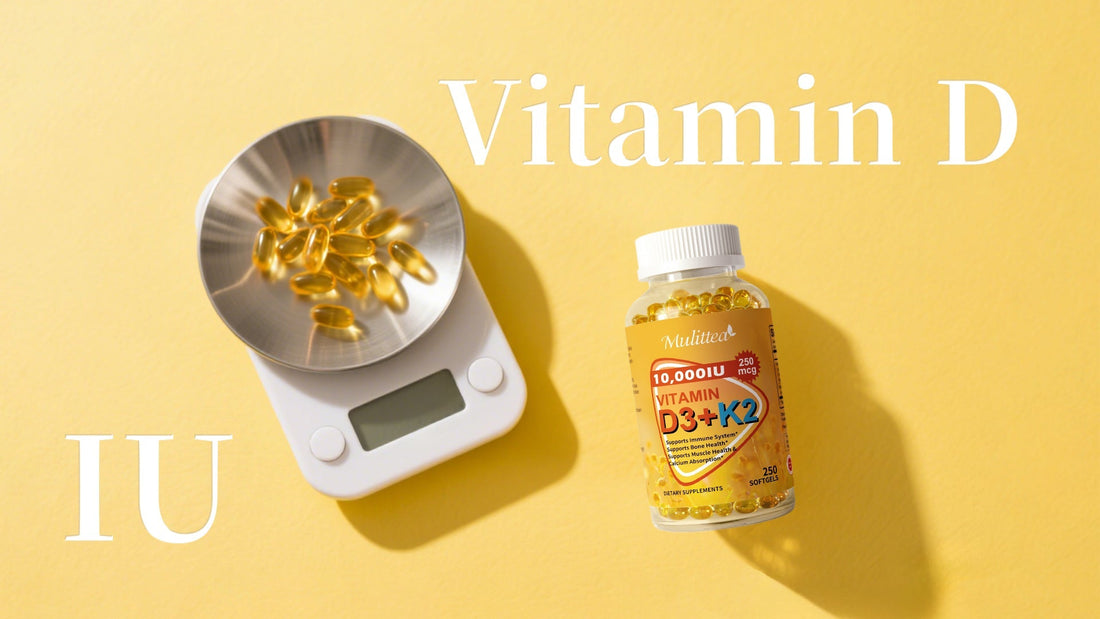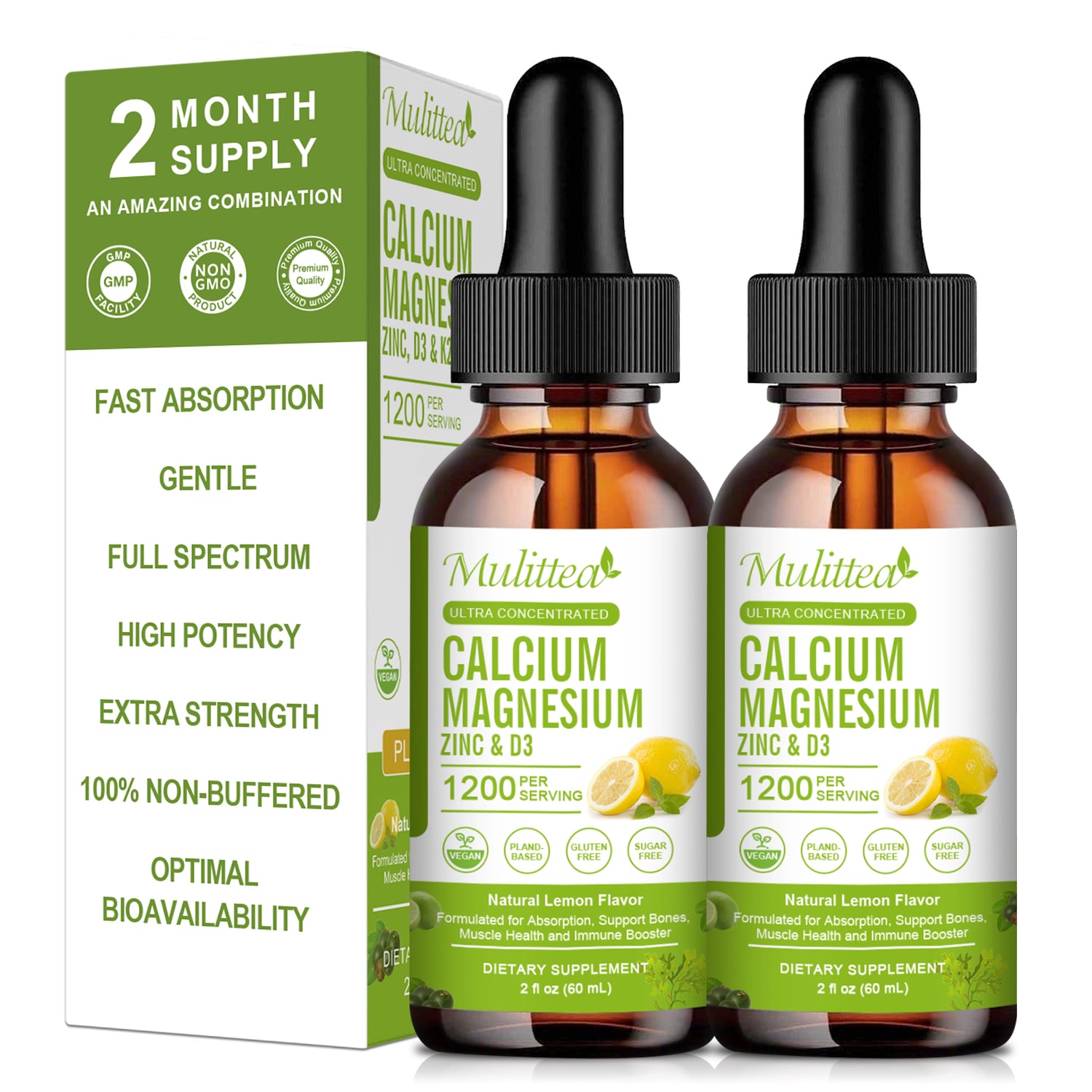
What does IU Mean in Vitamin D and How Much You Really Need
Share
Understanding IU in the context of Vitamin D is crucial for anyone considering supplementation. IU, or International Units, is a standard measurement used for vitamins. It helps ensure consistent dosing across different products.
Vitamin D plays a vital role in maintaining bone health and supporting the immune system. It can be obtained from sunlight, food, and supplements. However, not all Vitamin D is created equal.
Vitamin D3 is often preferred over D2 due to its better absorption. Knowing the difference can help you make informed choices.
Determining the right dosage is essential to avoid deficiency or toxicity. Consulting with a healthcare provider can guide you in finding the right balance.
This guide will explore these topics, helping you optimize your Vitamin D intake for better health.
What Does IU Mean on Vitamin D?
The term IU stands for International Units. It is commonly used to quantify vitamins and other nutrients. This helps maintain consistency and effectiveness across different brands and formulations.
For Vitamin D, IU is crucial in ensuring accurate dosage. This measurement allows consumers to compare supplements with ease. Understanding IU prevents overuse or underuse of essential nutrients.
International Units are also useful for standardizing dosages globally. Here's why IU matters for Vitamin D:
-
Provides a consistent measurement for supplements.
-
Allows easy comparison between different products.
-
Ensures correct dosage to meet health needs.
Knowing what IU means helps you make educated decisions about Vitamin D intake.
Vitamin D: Why It Matters for Your Health
Vitamin D is crucial for maintaining strong bones and teeth. It helps the body use calcium effectively. This nutrient supports bone density and reduces the risk of fractures.
Beyond bone health, Vitamin D plays a significant role in immune function. It helps the body fight off infections and supports a robust immune system. Mayo Clinic notes that low Vitamin D levels have been associated with increased susceptibility to infections.
Vitamin D also impacts mood and energy levels. It may help support a positive mood when levels are adequate.
Here’s why Vitamin D is important:
-
Promotes calcium absorption.
-
Supports immune and brain function.
-
Enhances mood and energy.
Getting enough Vitamin D contributes to overall well-being and health.
Vitamin D vs. Vitamin D3: What’s the Difference?
Vitamin D comes in two main forms: D2 and D3. Vitamin D3 is found in animal products. It's produced by the skin in response to sunlight.
Vitamin D2, on the other hand, originates from plant sources and fortified foods. The body absorbs Vitamin D3 more effectively, making it often the preferred supplement choice. A study published by the American Journal of Clinical Nutrition found that Vitamin D3 is more potent and has greater bioavailability compared to D2.
Here's what sets them apart:
-
Source: D3 is animal-based, D2 is plant-based.
-
Effectiveness: D3 is absorbed more efficiently.
-
Use: D3 is generally recommended for supplements.
The choice between them depends on dietary preferences and health goals. Consulting a healthcare provider can help determine the best option for individual needs.

How Much Vitamin D Should You Take? Dosage, IU, and mcg Explained
Understanding the right amount of Vitamin D is essential for health. The recommended daily intake can vary by age, gender, and individual needs.
According to the National Institutes of Health (NIH), the Recommended Dietary Allowance (RDA) for most adults is 600–800 IU per day.
Here’s how it breaks down:
-
Children: 400 IU to 600 IU
-
Adults up to 70 years: 600 IU to 800 IU
-
Seniors: 800 IU and above
The conversion between micrograms and IU is straightforward. One microgram of Vitamin D equals 40 IU.
-
1 mcg = 40 IU
-
10 mcg = 400 IU
It’s advisable to check your Vitamin D levels through a blood test to determine the exact dosage needed. This helps in avoiding deficiency or excessive intake. Always consult with a healthcare provider before beginning any supplement regimen to tailor the dose to your specific health requirements.
When and How to Take Vitamin D for Best Results
Timing your Vitamin D intake can affect its efficacy. It’s best to take Vitamin D with a meal containing some fat.
Since Vitamin D is fat-soluble, this aids absorption into the body. Many people prefer morning doses, aligning with breakfast.
Other important tips include:
-
Pair with meals that have healthy fats.
-
Aim for consistency at the same time each day.
-
Avoid taking it late in the day to prevent sleep disruptions.
For optimal results, try incorporating foods rich in Vitamin D. However, supplements can fill the gap if dietary intake and sunlight exposure are insufficient.
Vitamin D Deficiency: Signs, Risks, and Dosage Chart
Vitamin D deficiency is surprisingly common, especially in individuals with limited sun exposure, darker skin tones, or absorption issues. Symptoms such as fatigue, muscle weakness, and frequent illness may point to low Vitamin D levels, though many cases go unnoticed without blood testing.
While the general Recommended Dietary Allowance (RDA) for adults is between 600 IU and 800 IU, addressing a deficiency may require higher-dose supplementation under medical supervision.
According to the Endocrine Society’s clinical practice guidelines, adults with Vitamin D insufficiency may benefit from doses of 1,500 to 2,000 IU per day, and in more severe cases, short-term therapeutic doses of up to 10,000 IU per day may be used to restore adequate levels.
The Tolerable Upper Intake Level (UL) for adults, as defined by the NIH, is 4,000 IU per day for long-term use. However, research shows that temporary use of higher dosages—such as 10,000 IU daily for several weeks—may be safe and effective when correcting a documented deficiency, especially under the guidance of a healthcare provider.
Remember: Individual needs may vary. Consult with a healthcare provider to tailor Vitamin D intake to personal health requirements and prevent deficiency-related complications.
Choosing the Best Vitamin D Supplement for You
Selecting the right Vitamin D supplement involves considering individual health needs. It's essential to evaluate factors like age, dietary preferences, and specific health concerns.
When browsing options, look for high-quality supplements with verified labels. Products should ideally be tested for purity and potency. Consider the form of Vitamin D, as Vitamin D3 is often recommended due to better absorption.
Here’s a quick checklist for choosing supplements:
-
Form: Prefer Vitamin D3 for better efficacy
-
Dosage: Align with your daily recommended intake
-
Quality: Check for third-party testing and certifications
Consulting with a healthcare professional can further tailor your choice, ensuring optimal health benefits from your Vitamin D supplementation.
Safety, Side Effects, and Overdose: What You Need to Know
While Vitamin D is vital for health, overconsumption can lead to toxicity. Symptoms include nausea, vomiting, and even kidney damage. Thus, it's important to adhere to recommended dosages.
If you're considering high-dose supplements, consult a healthcare provider. They can help prevent potential adverse effects and ensure safe intake levels. Understanding these risks can help maintain a safe and effective Vitamin D regimen.
Key Takeaways
Understanding IU is crucial for gauging Vitamin D dosage effectively. With many health benefits tied to proper intake, it's vital to get the details right.
Here’s a quick recap of essential points:
-
IU measures vitamin potency, crucial for Vitamin D.
-
Vitamin D3 is favored for better absorption.
-
Dosage needs vary; consult healthcare advice.
-
Watch for overdose signs, like nausea or kidney issues.
-
Consistent, balanced intake supports bone and immune health.

